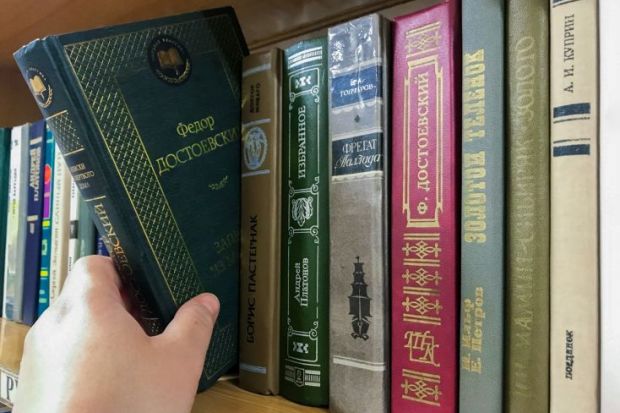A Ukrainian human rights group has criticised the breadth of a draft law banning the use of most Russian-language materials, saying it blocks access to core physics and philosophy texts.
The law is designed to protect Ukrainian education and science from Russian propaganda and the “chauvinistic, aggressive geopolitical doctrine of the ‘Russian peace’,” according to Ukrainian parliament officials.
It comes after scholars in Ukraine said methodologically flawed work in the social sciences and humanities helped justify Russia’s revanchist foreign policy under president Vladimir Putin.
Yevgeniy Zakharov, director of the Kharkiv Human Rights Protection Group, a prominent NGO, said the draft violates academic freedom protections in Ukraine’s 1996 constitution and is “ridiculous and extremely harmful to education and research”.
It would amend Ukraine’s education and research laws, banning the use of Russian-language information sources, or those created by Russians, in Russia, or by organisations registered there. Limited exceptions cover Russian studies or Russian-language education programmes, and sources that critically analyse Russian phenomena.
Dr Zakharov questioned how university-level physics could be taught without core physics and philosophy textbooks which he said were published only in Russian. He said the “absurd” law was “an attempt to solve complex problems with simple means” and its provisional adoption at first reading in December “demonstrates the naivety and immaturity of our young democracy”.
Speaking to Times Higher Education, Inna Sovsun, the Ukrainian MP who proposed the law, said it was a “very weird claim” that it violated academic freedoms in teaching, as the use of Russian language textbooks itself breaches laws that require education be provided in Ukrainian or an EU language.
She said MPs needed to do “more in-depth work” on the research implications of the law, but that she would propose an amendment allowing institutional academic councils to issue exceptions to it if there were was a “well-argued reason”. Professor Sovsun, who served as Ukraine’s deputy education minister in the 2010s, said the country was in a “post-colonial situation” and the law aimed to “limit” rather than ban Russia-related materials.
At a hearing on the draft, the Ukrainian parliament’s education committee noted the large number of scientific works in Russian and those of Ukrainian scientists published in Russian before the invasion of Crimea in 2014. Despite these issues, no committee members opposed the draft at its first reading, also voting to shorten the preparation period before its second reading.
Dr Zakharov said the prohibition against Russian sources was “very reminiscent” of Soviet rules that forbade the mention of Western scientists, referring to wordy definitions once used to avoid naming the German engineer Rudolf Diesel as an example.
Aside from academic freedom, he said the language-linked bar also breaches constitutional protections against discrimination on ethnic or linguistic grounds and sections against censorship. The draft comes after the June adoption of Ukrainian laws banning the import of books and public playing of music from Russia, as well as books from Belarus and Ukrainian territories under Russian occupation.
The prohibitions come as universities across North America and Europe report significant declines in enrolment of first-year Russian-language students, with scholars blaming the Kremlin’s war on Ukraine.
Dr Zakharov, who first rose to prominence as a dissident in the 1970s and 1980s and has served as co-head of a branch of the Memorial human rights society, called on politicians to withdraw the draft law.
Register to continue
Why register?
- Registration is free and only takes a moment
- Once registered, you can read 3 articles a month
- Sign up for our newsletter
Subscribe
Or subscribe for unlimited access to:
- Unlimited access to news, views, insights & reviews
- Digital editions
- Digital access to THE’s university and college rankings analysis
Already registered or a current subscriber? Login








